中考英语分册复习之七年级英语上册 Units 5-9 课件(103张PPT,无音频)
文档属性
| 名称 | 中考英语分册复习之七年级英语上册 Units 5-9 课件(103张PPT,无音频) |
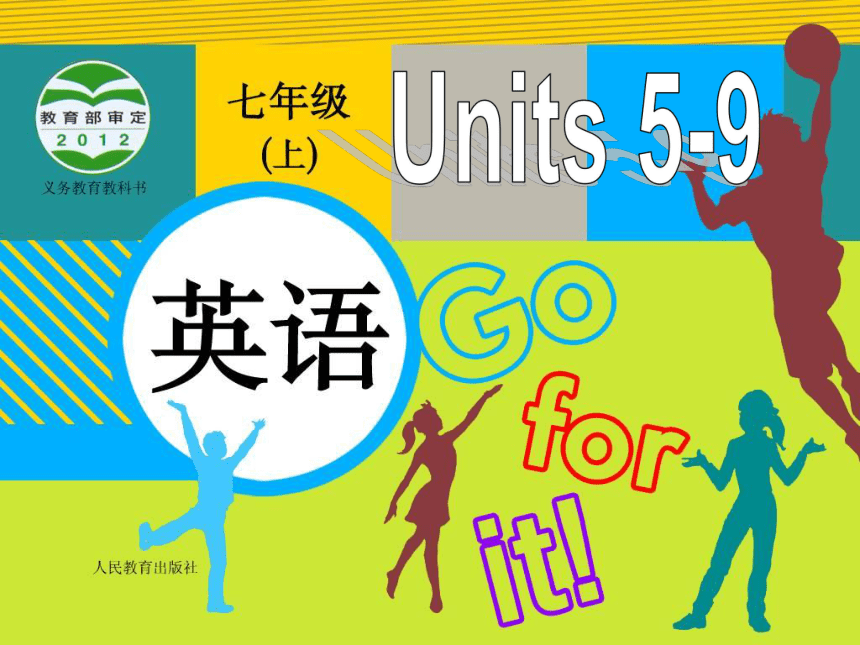
|
|
| 格式 | zip | ||
| 文件大小 | 1.3MB | ||
| 资源类型 | 教案 | ||
| 版本资源 | 人教新目标(Go for it)版 | ||
| 科目 | 英语 | ||
| 更新时间 | 2020-01-20 00:00:00 | ||
图片预览

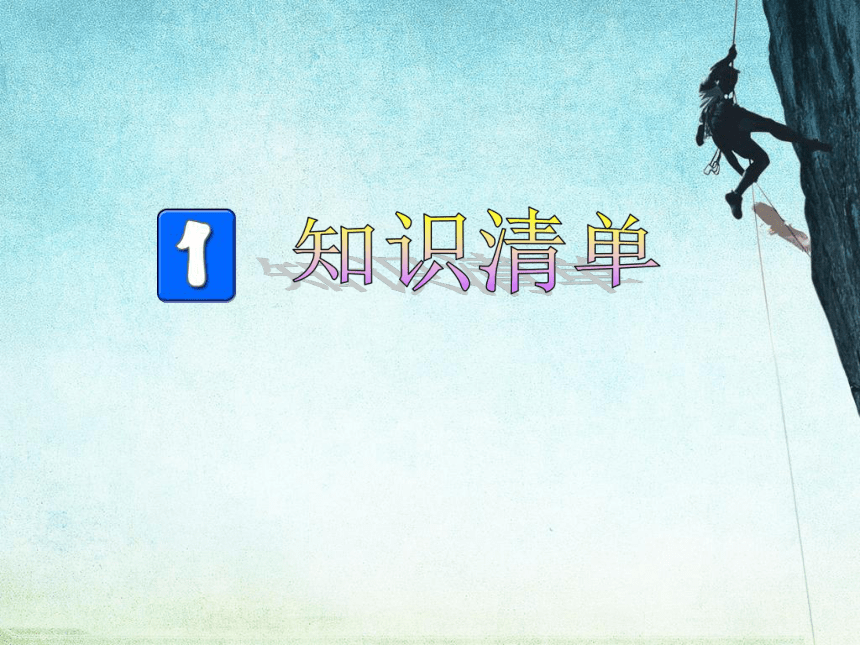
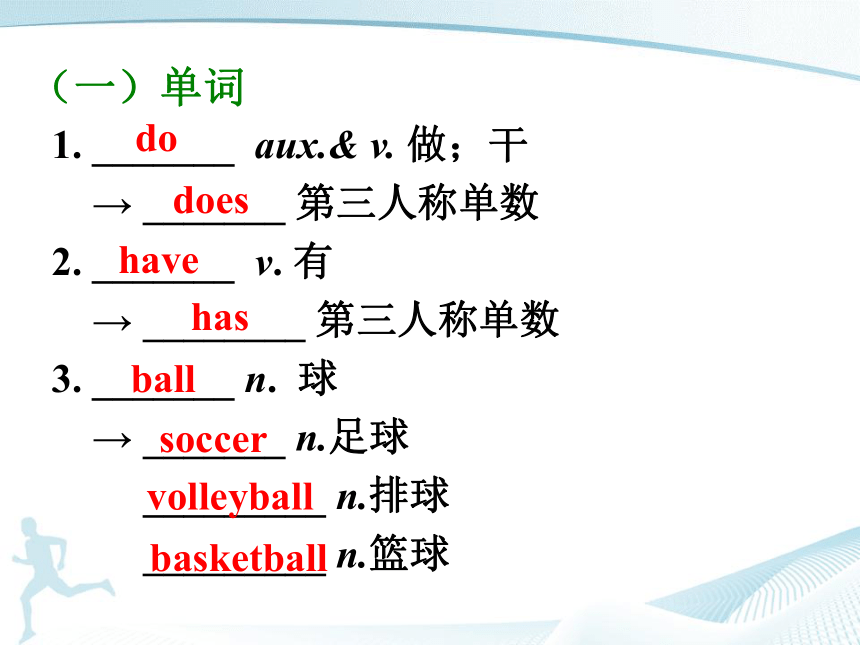
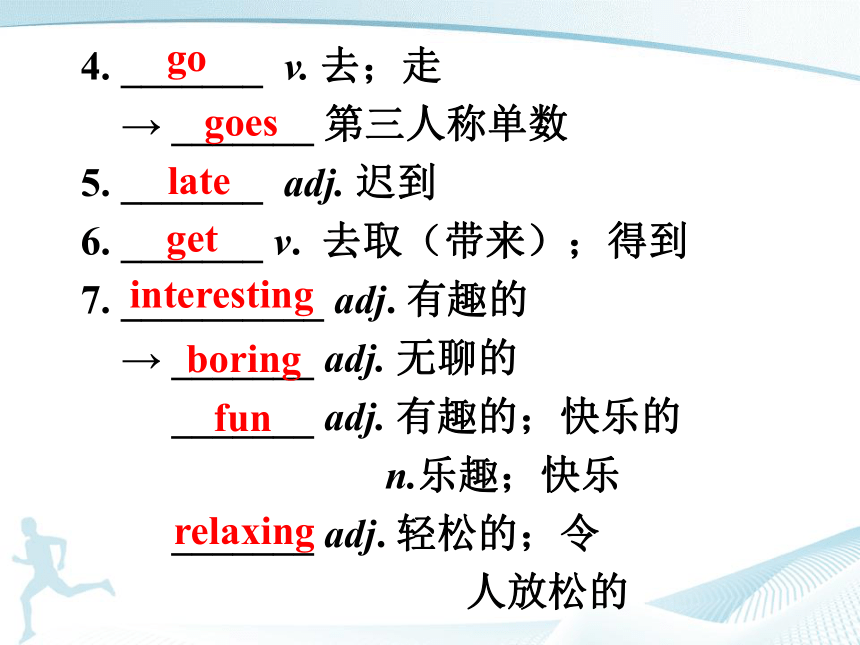
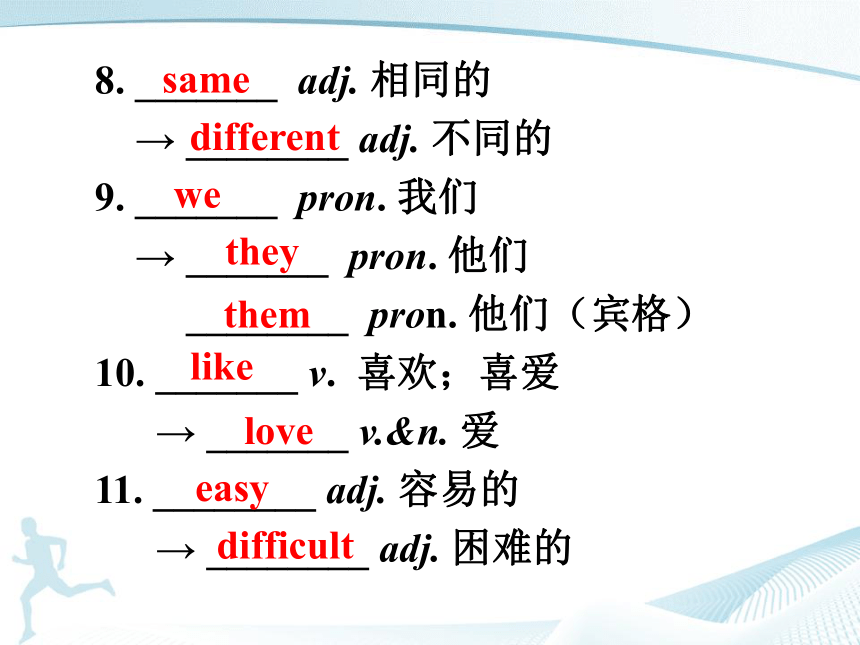
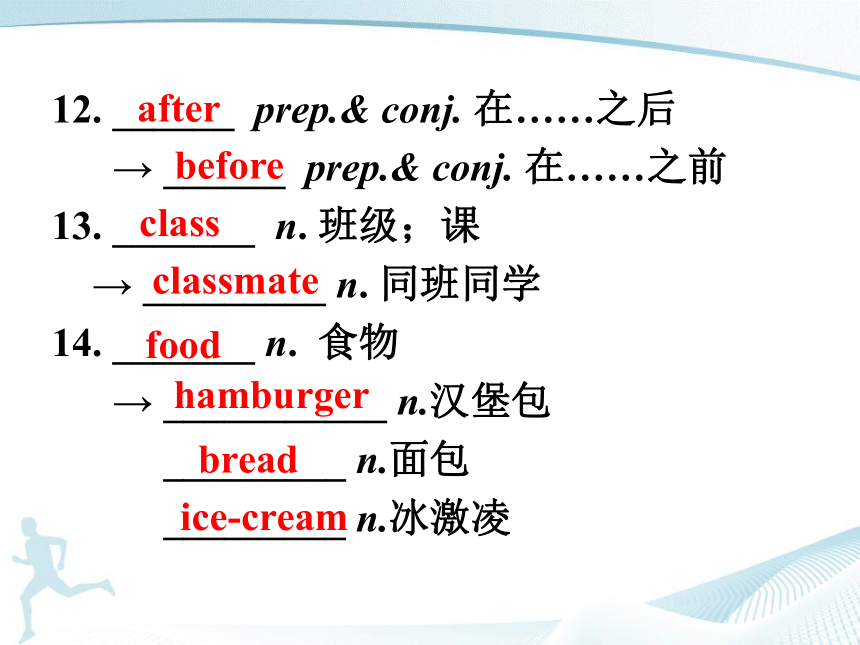
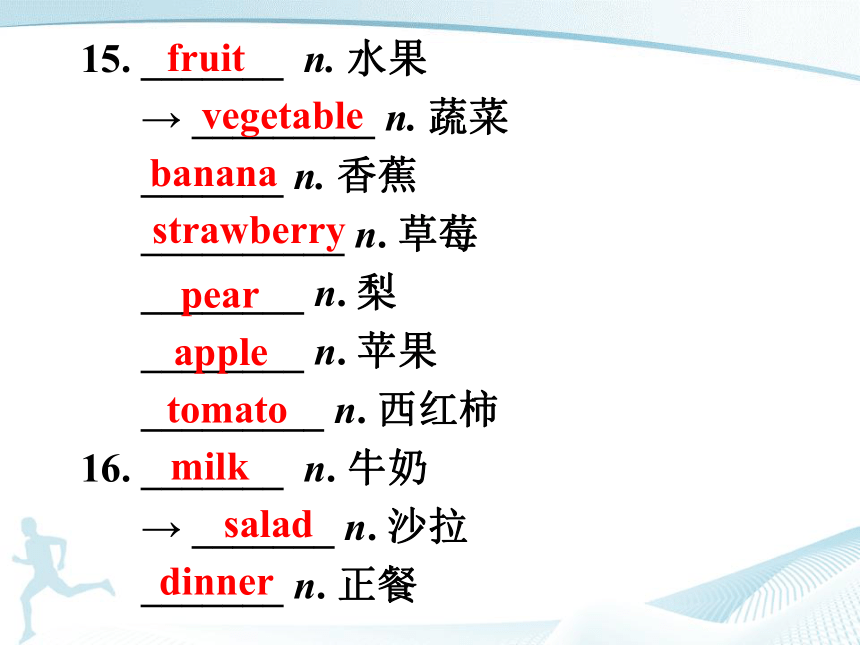
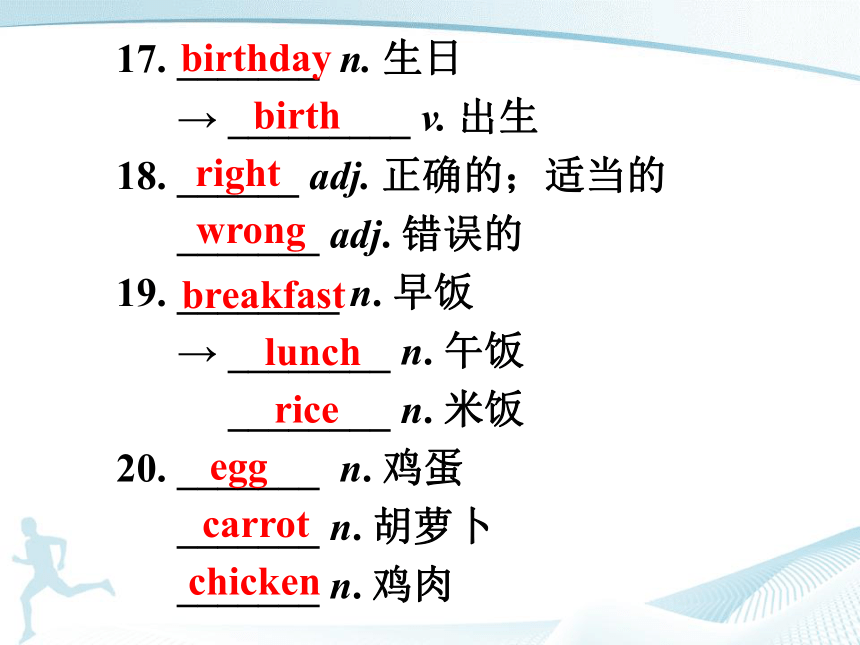
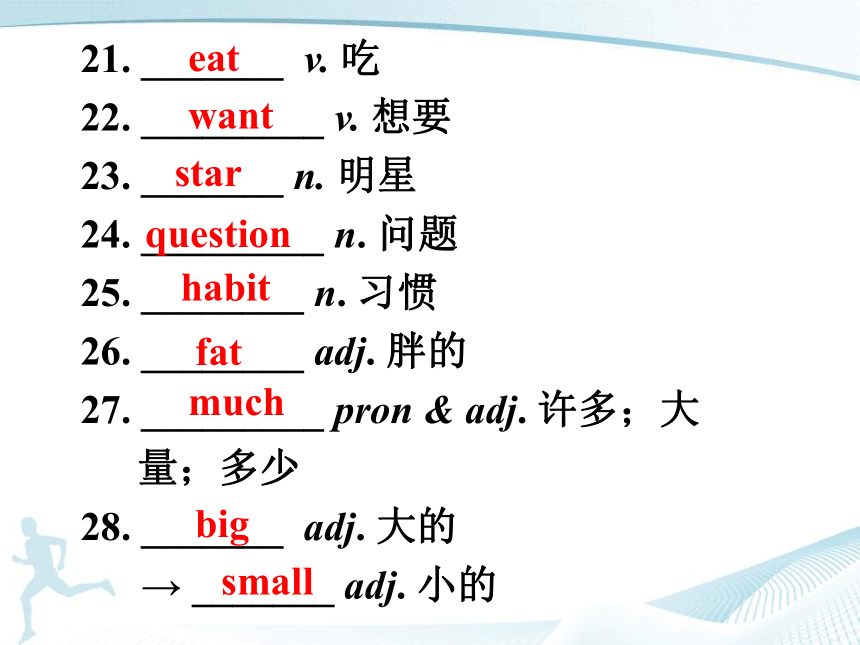
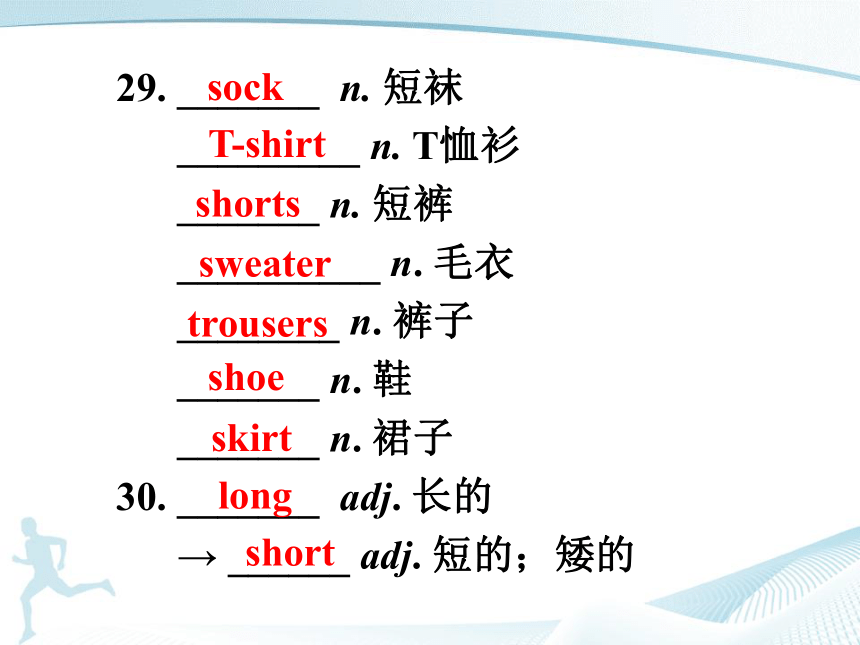
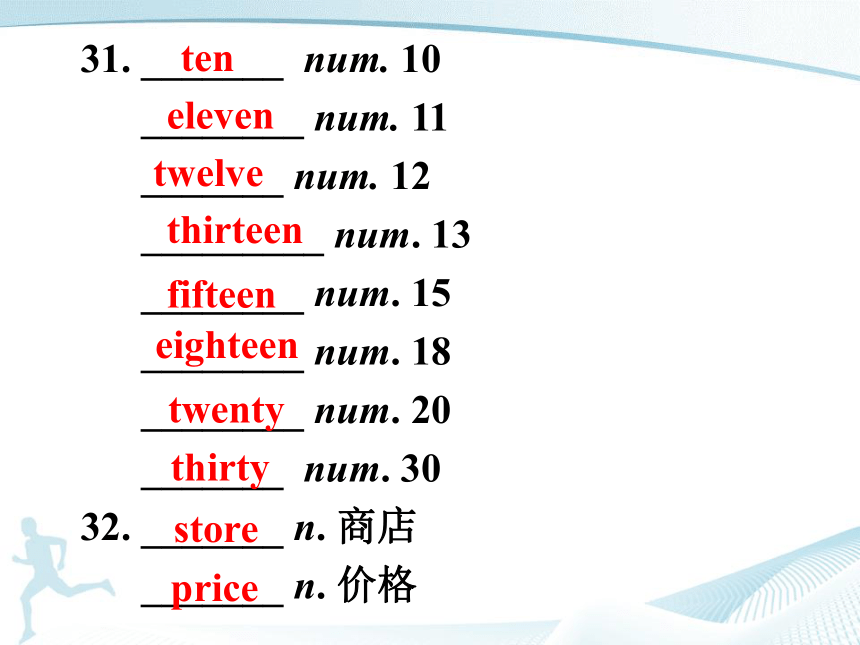
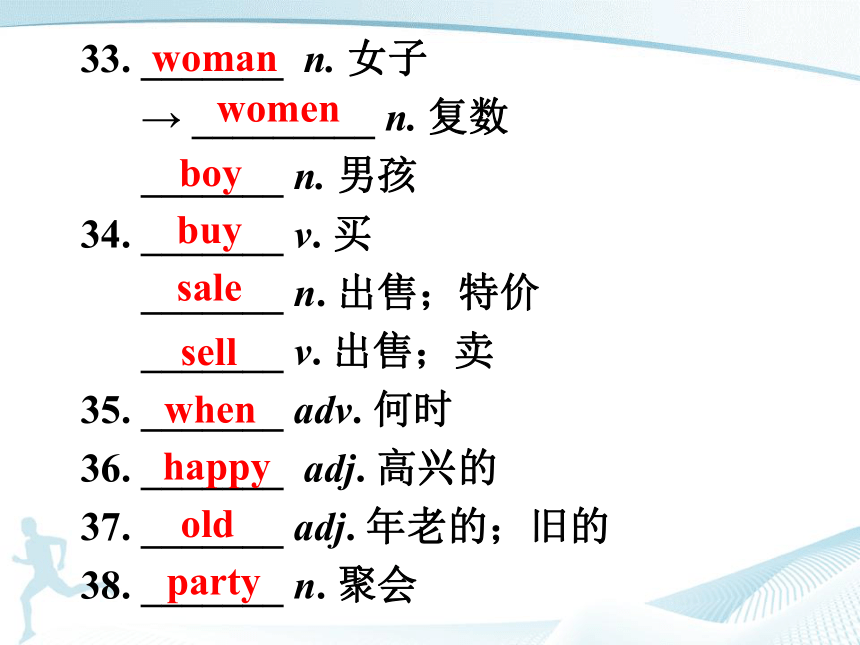
文档简介
课件103张PPT。Units 5-9知识清单(一)单词1. _______ aux.& v. 做;干
→ _______ 第三人称单数
2. _______ v. 有
→ ________ 第三人称单数
3. _______ n. 球
→ _______ n.足球
_________ n.排球
_________ n.篮球dodoeshavehasballsoccervolleyballbasketball4. _______ v. 去;走
→ _______ 第三人称单数
5. _______ adj. 迟到
6. _______ v. 去取(带来);得到
7. __________ adj. 有趣的
→ _______ adj. 无聊的
_______ adj. 有趣的;快乐的
n.乐趣;快乐
_______ adj. 轻松的;令
人放松的gogoeslategetinterestingboringfunrelaxing8. _______ adj. 相同的
→ ________ adj. 不同的
9. _______ pron. 我们
→ _______ pron. 他们
________ pron. 他们(宾格)
10. _______ v. 喜欢;喜爱
→ _______ v.&n. 爱
11. ________ adj. 容易的
→ ________ adj. 困难的samedifferentwetheythemlikeloveeasydifficult12. ______ prep.& conj. 在……之后
→ ______ prep.& conj. 在……之前
13. _______ n. 班级;课
→ _________ n. 同班同学
14. _______ n. 食物
→ ___________ n.汉堡包
_________ n.面包
_________ n.冰激凌afterbeforeclassclassmatefoodhamburgerbreadice-cream15. _______ n. 水果
→ _________ n. 蔬菜
_______ n. 香蕉
__________ n. 草莓
________ n. 梨
________ n. 苹果
_________ n. 西红柿
16. _______ n. 牛奶
→ _______ n. 沙拉
_______ n. 正餐fruitvegetablebananastrawberrypearappletomatomilksaladdinner17. _______ n. 生日
→ _________ v. 出生
18. ______ adj. 正确的;适当的
_______ adj. 错误的
19. ________ n. 早饭
→ ________ n. 午饭
________ n. 米饭
20. _______ n. 鸡蛋
_______ n. 胡萝卜
_______ n. 鸡肉birthdaybirthrightwrongbreakfastlunchriceeggcarrotchicken21. _______ v. 吃
22. _________ v. 想要
23. _______ n. 明星
24. _________ n. 问题
25. ________ n. 习惯
26. ________ adj. 胖的
27. _________ pron & adj. 许多;大量;多少
28. _______ adj. 大的
→ _______ adj. 小的eatwantstarquestionhabitfatmuchbigsmall29. _______ n. 短袜
_________ n. T恤衫
_______ n. 短裤
__________ n. 毛衣
________ n. 裤子
_______ n. 鞋
_______ n. 裙子
30. _______ adj. 长的
→ ______ adj. 短的;矮的sockT-shirtshortssweatertrousersshoeskirtlongshort31. _______ num. 10
________ num. 11
_______ num. 12
_________ num. 13
________ num. 15
________ num. 18
________ num. 20
_______ num. 30
32. _______ n. 商店
_______ n. 价格teneleventwelvethirteenfifteeneighteentwentythirtystoreprice33. _______ n. 女子
→ _________ n. 复数
_______ n. 男孩
34. _______ v. 买
_______ n. 出售;特价
_______ v. 出售;卖
35. _______ adv. 何时
36. _______ adj. 高兴的
37. _______ adj. 年老的;旧的
38. _______ n. 聚会womanwomenboybuysalesellwhenhappyoldparty39. _______ n. 月
_________ n. 1月
_________ n. 2月
_______ n. 3月
_______ n. 4月
_______ n. 5月
_______ n. 6月
_______ n. 7月
_______ n. 8月
___________ n. 9月monthJanuaryFebruaryMarchAprilMayJuneJulyAugustSeptember40. _______ n. 10月
_________ n. 11月
_________ n. 12月
41. _______ num. 第一
_______ num. 第二
_______ num. 第三
_______ num. 第五
_______ num. 第八
_______ num. 第九
_______ num. 第十二OctoberNovemberDecemberfirstsecondthirdfiftheighthninthtwelfth _______ num. 第二十
42. _________ n. 测验;检查
43. _________ n. 旅行;旅游
44. _______ n. 艺术;美术
45. _______ n. 节日
46. _______ n. 学生
47. _______ n. 学期
48. _______ adj. 忙碌的
49. _____ n. 时间
50. _______ adv. 那里twentiethtesttripartfestivalstudenttermbusytimethere51. _______ n. 星期一
__________ n. 星期二
__________ n. 星期三
________ n. 星期四
_______ n. 星期五
_______ n. 星期六
_______ n. 星期天
52. _______ conj. 高兴的
53. _______ adv. 年老的;旧的
54. _______ adj. 聚会MondayTuesdayWednesdayThursdayFridaySaturdaySundaybecausewhyfree55. _______ n. 科目
_______ n. 科学
_______ n. 音乐
______ n. 数学
_______ n. 语文;汉语
__________ n. 地理
_______ n. 历史
56. _______ adj & n. 喜爱的
57. _______ adj. 有用的
58. _______ v. 完成;做好subjectsciencemusicmathChinesegeographyhistoryfavoriteusefulfinish1. ___________? 课后
2. ________________________?
一节两小时的美术课
3. _____________? 一双鞋???? 4. ___________? 艺术节
5. _______________?询问某人有关某事/物
6. _________? 在学校???????????? ????
7. ______________ ?篮球比赛(二)短语after classan art lesson for two hoursa pair of shoesart festivalask sb. about sth.at schoolbasketball game8. _____________ ?生日聚会
9. ___________ ?图书展销? ????
10. ____________? 服装店
11. ___________ 饮食习惯
12. ___________? 英语测验
13. _________ ?无疑;肯定
14. ________________ ?从十二点钟到一点钟
15. __________________ ?在同一所学校上学
16. _____________? 上历史课?birthday partybook saleclothes storeeating habitsEnglish testfor surefrom 12:00 to 1:00go to the same schoolhave history17. ___________?健康食品
18. ___________?看起来好看??? 19. _____________?乒乓球拍
20. ___________________?玩电脑游戏
21. _____________? 打?/?踢……
22. ___________?学校开放日
23. ___________?学校郊游
24. ___________?以……价格卖……healthy foodlook niceping-pong batplay computer gamesplay+球类运动School Dayschool tripsell ... at ...25. ___________?体育明星????????????
26. ___________?第二天
27. ___________?思考;思索? ?
28. _________?本学期
29. ______________?蔬菜沙拉?????? ?
30. __________?看电视sports starthe next daythink aboutthis termvegetable saladwatch TV1. —Do/ Does ... have ...?
—Yes, ... do/ does. / No, ... don’t/ doesn’t.
—……有……吗?
—是的,……有。/?不,……没有。
2. ... don’t/ doesn’t have ...? ?……没有……
3. Let sb. do sth.? 让某人做某事。
Let’s do sth.? 让我们一起做某事吧。
4. I think ... ?我想/?认为……
5. That sounds ...? 那听起来……(三 )句型 6. sth. is ... for sb.?某事对某人来说……
7. —Do / Does ... like ...?
—Yes, ... do/ does. / No, ... don’t/ doesn’t.
—……喜欢……吗?
—是的,……喜欢。/?不,……不喜欢。
8. How is your day??今天过得如何?
9. What do you like for breakfast/ lunch/ dinner?
你早饭/?午饭/?晚饭喜欢吃什么?10. —How much is/ are ...?
—It’s/ They’re ...
—……多少钱?
—它/?它们是……
11. ... is / are only +钱数+ for ... pair(s).
……双?/?条……仅售……
12. Come and do sth.?来做某事。13. —When is ... birthday?
—... birthday is on ... / It’s on ...
—……生日是什么时候?
—……生日是在……/?是在……
14. How old is/ are ...?
……多大了/几岁了?
15. —What’s ... favorite subject?
—... favorite subject is .../ It’s ...
—……最喜欢的科目是什么?
—……最喜欢的科目是……/?是……16. —Why do / does ... like ...?
—Because ...
—……为什么喜欢……?
—因为……
17. Who likes ...?? 谁喜欢……?
18. Who is ...?? 谁是……?
19. When is ... class?
……课是什么时候?核心要点(一)单词
1. want??
为及物动词,“需要;想要”。
【归纳】
want sth.?“想要某物”;
want to do sth.?“想要做某事”。【运用】根据汉语意思完成英语句子,每空词数不限。
1)?我想要一件夹克衫。
I __________ a jacket.
2)?他们想去云南。
They __________ to Yunnan.wantwant to go2. for
【归纳】
表示对象,“对;给”;表示目的,意为“为……”;表示产品或服务的开支,“用;花”,用于“物品+for+价格”或“价格+for+物品”结构中。
【运用】写出下列各句中for的汉语意思。
1) It’s 10 yuan for the pen. ______
2) It’s a book for children. ______
3) We need some T-shirts for school. ______用;花对;给为……3. in, on & at
【归纳】
都可与表示时间的词连用,但用法不同。
in常用于表月份、年、上午、下午或晚上等词语前。
?on常用于表星期、日期等具体某一天的词语前。
?at常用于表具体的某一时刻的词语前。【运用】根据句意,选用in, on或at填空。
1) I go to school ______ 7:30 every morning.?
2) Our English test is ______ December 10th.
3) We want to go to Beijing ______ November.aton in4. favorite
【归纳】
adj. 特别喜爱的
?n. 可数名词,特别喜爱的人或事物。【运用】完成句子,每空一词。
1)?这是我最喜欢的书。
This is _______ ________ _______.
2)?我是我父母最宠爱的孩子。
I’m my ________ ________.parents’ favoritemy favorite book5. have
【归纳】
v. “有”,一般指某人拥有某物,侧重于所属关系。第三人称单数形式has。
【拓展】
常用句式:某人 + have/has + 某物,表示“某人有某物”。
一般现在时态中,当主语为第三人称单数形式时,用has的形式。6. we, us & our
【归纳】
we是人称代词主格,“我们”,在句子中作主语。
us “我们”, 是we的宾格形式,在句子
中放在介词或动词后作宾语。
our “我们的”是形容词性物主代词,放
在名词前。 7. easy
【归纳】
easy adj. 意为“容易的; 不费力的”, 反义词是difficult。
【拓展】
sth. is easy/difficult for sb.
对某人来说某事是容易的/困难的。 8. well
【归纳】
用作副词,意为 “好”,用来修饰动 词,意为“……得好”。
【拓展】
good adj. 常置于名词之前,表示“好的”。
well adv.,常置于动词之后,表示程度
“好;满意地”;adj. “身体好”。【运用】根据句子意思填空。
Mr. Wang is a _____ teacher.
王老师是一位好老师。
The boy can swim very ______.
这个男孩游泳游得很好。
— How is your father?
你的爸爸身体怎么样?
— He’s very _____. 他很好。wellwellgood9. need
【归纳】
v. “需要”。
【拓展】
need sth. 需要某物
need to do sth. 需要做某事,主语是人。
need… for… 需要……去做…… (二)短语
1. play basketball 打篮球
【归纳】
play作动词,意为“玩;娱乐;参加(运动或比赛);打;演奏”等。
【拓展】
play soccer / volleyball
play tennis / play ping-pong
play baseball play games2. watch… on TV
在电视上看……(节目)
【归纳】
watch v. 观看; 注视, 强调“观看”其动作。
on TV是固定短语, “在电视上”。3. think about
思考,思索
【归纳】
一般是短时间的较仔细的考虑。
【拓展】
think of 想到;想象;设想
多用来指“想起,认为”。4. in purple
【归纳】
in + 颜色,“穿……颜色的”。(三)句式
1. Well, let’s play basketball.
let’s是let us的缩写形式,后跟动词原形。常用来提出建议,意为“让我们……吧”。肯定答语可用OK. / Great. / That sounds good.等;否定答语可用Sorry, I ...等。
? let?还可用于let sb. do sth.结构,?意为“让某人做某事”。2. When is your birthday, Linda?
when是疑问副词,意为“什么时候;何时”,常见结构为 “When + be/助动词 +主语(+其他)?” 用来询问时间,既可询问某个时段或时刻,也可询问具体的日期。【运用】根据意思翻译下列句子。
— __________________________
(足球比赛在什么时候?)
— It’s on September 15th.
在9月15号。— _______________________________
你每天什么时候看电视?
— At eight o’clock. 八点钟。 When is the football match?When do you watch TV every day?3. How old are you?
how old意为“多大年纪;几岁”,引导特殊疑问句询问年龄。其句型结构为“How old + be +主语?”答语通常为“主语 + be + 基数词 + years old”, 其中years old可以省略。【运用】根据提示完成下列对话。
— ____________ your cousin? 你表姐多大了? — She’s ___________________.
她13岁了。
—____________ your grandparents? 你爷爷奶奶多大岁数了? — They’re eighty.
他们八十岁了。How old isthirteen (years old)How old arehave a good time也是一个固定词组,意为“玩得高兴;过得愉快”,相当于have fun或enjoy oneself (oneself 随主语的变化而变化)。4. Have a good time!
意为“祝你玩得高兴!”。5. It’s easy for me.
sth. + be +形容词+ for sb. 表示“……对于某人来说是……的”。?sb.可为名词或人称代词的宾格形式。6. Do you have…?”
表示你有……吗?, 用于询问物品的所属关系。这是实义动词的一般疑问句结构。
当主语是第一人称/第二人称/第三人称复数时, 句型结构为:Do + you/ they/ we/… + 动词原形 + …?肯定回答:
Yes, I do./ Yes, we do. / Yes, they do.
否定回答:
No, I don’t /we don’t. /No, they don’t.当主语为第三人称单数时,句子结构改为: Does + he / she / it … + 动词原形 + …?
肯定回答:
Yes, he does./Yes, she does./Yes, it does.
否定回答:
No, he doesn’t./No, she doesn’t /
No, it doesn’t. 7. I don’t have a soccer ball, but my brother Alan does.
does是do的第三人称单数形式。此处用do来代替上文出现过的动词或动词词组,以避免重复。does代替上文出现过的have a soccer ball。 e.g. 杰克不打排球, 但他的姐姐打。
Jack doesn’t play volleyball, but
his sister does.
琳达有一个棒球拍, 但是我没有。
Linda have a baseball bat, but I
don’t. 8. How about burgers, vegetable salad…?
相当于 What about …? 意为“……怎么样?”是一个用来征询别人的意见、向别人提建议的交际用语。about是介词,后跟名词、代词或动词-ing形式。9. Can I help you?
这句话是商店、饭店等场所的服务人员主动询问顾客需要的常用表达,意为“您想买 点什么吗?”或“您想吃点什么吗?”等。如果顾客需要,可以回答Yes, please. I want ...;如果顾客不需要,可以回答No, thanks.?【运用】将下列对话翻译成汉语。
1) —Can I help you?
—Yes, please. I want some rice and chicken.
— 您想吃点什么吗?
— 是的,我想吃米饭和鸡肉。
2) —Can I help you?
—Yes, please. I can’t find my book.
— 需要帮忙吗?
— 是的,我找不到我的书了。10. I’ll take it.
“我买下了”。句中take意为“买下”,相当于buy / get。在口语中,顾客选好商品并决定购买时,通常说I’ll take it / them.?而不说I’ll buy it / them.?动词have(有)用于一般现在时,其形式要随主语的变化而变化。观察下面例子,补全结论部分所缺内容。
肯定句
I / We / They have a tape player.
She / He / Tom has two schoolbags.have的一般现在时(四)语法否定句
I / We / They don’t have a tape player.
She / He / Tom doesn’t have two schoolbags.
一般疑问句及其简略答语
—Do you / they have a tape player?
—Yes, I / we / they do. / No, I / we / they don’t.
—Does she / he / Tom have two schoolbags?
—Yes, she / he does. / No, she / he doesn’t.【结论】
1.?在含有动词have(有)?的一般现在时的肯定句中,当主语是第三人称单数时用______,当主语不是第三人称单数时用have。has2.?将含有动词have / has(有)的一般现在时的肯定句变成否定句时,要借助助动词do或does(主语是第三人称单数时用_______,主语不是第三人称单数时用do),并在其后加not,且句中动词要用原形have。注意:do / does not可缩略为don’t / doesn’t。does3.?将含有动词have / has(有)的一般现在时的肯定句变成一般疑问句时,要将助动词do或does放到主语前,且句中动词要用原形have。其肯定答语为“Yes,?主语(人称代词) + do / does.”,否定答语为“No,主语?(人称代词) + don’t / doesn’t.”。
【运用】根据汉语意思完成句子或对话。
1.?他们有两个杯子。
______ ______ two cups.??
2.?吉娜的妹妹没有手机。
Gina’s sister ________ _____ a mobile phone.
3.?——你有手表吗?
——是的,我有。
—______ you ______ a watch?
—Yes, I _____.haveThey havedoesn’t haveDodo一、可数名词
1.?可数名词有单数和复数两种形式。
2.?可数名词可被基数词(如one),不定冠词(a, an)或these, those, all, some, many, several, few, a few, a lot of, lots of, enough, plenty of, a number of等修饰。如:two pencils, a banana, several children, plenty of apples。可数名词和不可数名词3.?对可数名词的量提问用how many。如:
There are?ten?books on the desk.
→How many books are there on the desk?二、不可数名词
不可数名词没有单数与复数形式之分,也
不能与不定冠词a或an连用。
1.?表示不可数名词的量时,通常使用相应的单位词,如piece, cup, bowl等,复数形式常体现在单位词上。如:
a piece of paper?→?two pieces of paper
a cup of tea?→?three cups of tea2.?不可数名词作主语时,谓语动词用单数形式。如:
The milk smells terrible and you can’t drink it.3.?常见的修饰不可数名词的词语有all, some, much, little, a little, a lot of, lots of, enough, plenty of等。如:much money,a little water。
4.?对不可数名词的量提问用how much。如:
I need?a kilo of?water.
→How much water do you need?
注意:all, some, a lot of, lots of, plenty of既可
修饰可数名词,也可修饰不可数名词。【运用】单项选择。
1. Health is important for us teenagers, so we should eat more vegetables such as _____ to keep healthy. ?
(2015?黑龙江哈尔滨)
A. tomatoes and potatoes? ??
B. tomatos and potatos?
C. tomatos and potatoes2. I paid¥10 for ______ this morning.
(2015?甘肃兰州)
A. 4 bottle milks? ??? B. 4 bottles of milk
C. 4 bottles of milks?? ? D. 4 milk
3. —______ people travel every year?
—Perhaps when we are talking about it, more than 100 planes have taken off around the world. ? (2015?山东临沂)
A. How many ? ? ? ? ? ? B. How much????
C. How long?? ???????? ???D. How often用法:
1.?表示现在的状态。Jim doesn’t have a model plane.
2.?表示经常发生的动作,句中常有always, every day等词语。如:
“Where is my pencil?” Linda always asks.
I play basketball every day.含有实义动词的一般现在时3.?表示主语具备的性格和能力等。如:
They don’t like chicken.
Do you like to eat ice-cream?句式:
1.?肯定句:
主语?+?动词原形?/?动词的第三人称单数?+?其他.
2.?否定句:
主语?+ don’t / doesn’t +?动词原形?+?其他.3.?一般疑问句:
Do / Does +?主语?+?动词原形?+?其他?
肯定回答:
Yes,?主语?(人称代词) + do / does.
否定回答:
No,?主语?(人称代词) + don’t / doesn’t.【运用】根据意思完成句子。
1.?戴尔经常帮助他们。??
Dale often __________.?
2.? ——她喜欢那个帽子吗?
——是的,她喜欢。
—_____________ that hat?
—Yes, __________.
3.?他每天都不看电视。
He ________________ every day.helps themshe does?Does she likedoesn’t watch TV?疑问词
特殊疑问句由疑问词引导,不同的疑问词用来询问不同的对象。
what意为“什么”,通常用来询问名字、电话号码或某物。如:
What’s your name / telephone number / favorite subject?
What is this (in English)?特殊疑问句what后可跟名词,一起引导特殊疑问句。如:What color is it?
why意为“为什么”,用来询问原因,回答why引导的特殊疑问句时多用由because引导的句子。?如:
—Why do you like math?
—Because it’s interesting.when意为“何时”,常用来询问时间。如:
When is your birthday?
who意为“谁”,用来询问人。如:
Who is that boy?
由how, how old, how much, where引导的特殊疑问句。如:
How are you?
How old is the boy?
How much is the hat?
Where is your ruler?句型结构
含be动词的一般现在时的特殊疑问句的句型结构“疑问词(不作主语)+ am / is / are +?主语?(+?其他)?”。如:
When is your Chinese class?
含实义动词的一般现在时的特殊疑问句的句型结构“疑问词(不作主语) + do / does +?主语?+?动词原形?+其他?”。如:
When does Joe play basketball?【运用】对划线部分提问。
1. Their English Day is?on October 21st.
___________________________
2. My cousin is?Cindy.
___________________________
3. I like art?because it’s interesting.
___________________________
4. Bill’s favorite fruits are?apples and strawberries.
___________________________Why do you like art?Who is your cousin?When is their English day????What are Bill's favorite fruits? ?(五)交际用语
一、喜欢和不喜欢(Likes and dislikes)
I like / love the movie (very much).
I like / love to play computer games.
I like taking photos.
I enjoy listening to music.
I’m interested in science.
I don’t like the movie very much/ at all.
I don’t enjoy collecting stamps.
I hate to do homework.?二、购物(Shopping)
A. Can / May I help you?
What can I do for you?
How many / much do you like?
What color / size / kind do you like?
What about this one?
Here’s your change.B. I want / I’d like / I’m looking for a shirt.
How much is it / are they?
Can I try it / them on?
It’s / They’re too big / small.
Sorry, it’s / they’re too expensive. Have you got anything cheaper??
Do you have any other colors / sizes / kinds?
Two and a half kilos / pounds, please.
That’s fine. I’ll take it / them.
Just have a look. A. Thank you for telling me so much.
B. How old are you?
C. What time do you usually get up?
D. What subject do you like best?
E. I don’t like math!?????
F. At half past seven.
G. I often do some sports.【运用】Ⅰ. 根据对话内容,选择恰当的选项补全对话,其中有两项多余。A: Laura, may I ask you some questions?
B: Sure.
A: (1) ________
B: At six o’clock.
A: What time do you usually go to school?
B: (2) ________
A: What do you often do before breakfast?CFB: (3) ________
A: Do you like English?
B: No, I don’t.
A: (4) ________
B: Science.
A: That’s all. (5) ________
B: You’re welcome.AGDⅡ.?根据对话内容,在空白处填入恰当的句
子,使对话完整、通顺。
A: Good morning! (1) ______________?
B: Yes, please. I’d like to buy a pair of tennis shoes.
A: Look! We have two colors. Which color do you like better?
B: I prefer?white to black.
A: (2) _____________________________?
B: Size 7.Can I help?youWhat size shoes do you wear/ takeA: How about this pair?
B: They look nice and soft. (3) _____________________?
A: Certainly.
B: Oh, I’m afraid they’re a little small?for me.
A: Here’s another pair in size 7.5. What do you think of them?
B: Oh, good. They’re big enough. (4) _________________?
A: 80 dollars. B: They’re too expensive.
A: Maybe. But good things always cost much.
B: OK. (5) ______________.I’ll take themMay / Can I try them onHow much are they巩固练习Ⅰ.?根据句意,选择恰当的单词填空。
festival, test, sell, free, difficult, all, busy, get
1. Students are often worried about their ________.
2. Mary has lots of work to do. She is really ________.
3. Nick ________ a new bike for 200 yuan yesterday.
4. Are you ________ this afternoon? Let’s go shopping.busytestsgotfree5. Christmas is the most important ________ in the Western countries.
6. ________ my friends came to see me when I was ill. I was very happy.
7. It is ________ for me to learn English well. Could you please help me?
8. We collected many bottles and ________ them for money.All?festivalsolddifficultⅡ.?根据语境及所给单词的提示填空。
1. Please finish ________ (read) the book before supper.
2. —Where is your office?
—It’s on the ________ (twelve) floor.
3. My father had a ________ (relax) weekend with his friends.
4. Mom gave me a piece of advice on how to cook ________ (tomato).readingtwelfthrelaxingtomatoes5. There are many kinds of ___________ (strawberry) in the world.
6. This book is very _______ (use). It’s worth buying.
7. People in different places have different eating _______ (habit).
8. I was invited to two _______ (party) on the same day. What should I do?strawberriesuseful?habits?partiesⅢ. 翻译下列句子。
1.?—她有一个网球吗?
—是的,她有。/?不,她没有。她有一个棒球。
________________________________
________________________________
________________________________
2.?让我们去打篮球吧!
________________________________—Does she have a tennis ball?
—Yes, she does. /
No, she doesn’t. She has a baseball.Let’s play basketball!3.?那听起来不错。
______________________________
4.?足球运动对我来说挺难的。
______________________________That sounds good.?????Soccer is difficult for me.5. —他们喜欢梨吗?
—是的,他们喜欢。/?不,他们不喜欢。
_____________________________
_____________________________
6. 他不喜欢蔬菜。
_____________________________
7. 你早餐喜欢吃什么?
_____________________________—Do they like pears?
—Yes, they do. / No, they don’t.He doesn’t like vegetables.What do you like for breakfast????8.?—这件T恤衫多少钱?
—7美元。
_______________________________
_______________________________
9.?—这些短袜多少钱?
—2美元。
_______________________________
_______________________________—How much are these socks?
—They’re two dollars / Two dollars.—How much is this T-shirt?
—It’s seven dollars / Seven dollars.10. —你的生日是什么时候?
—5月2日。
________________________________
________________________________
11.?—你多大了?
—我十三岁了。
________________________________
________________________________—When is your birthday?
—My birthday is / It’s on May 2nd.—How old are you?
—I’m thirteen (years old).12.?—你最喜欢的科目是什么?
—我最喜欢的科目是科学。
____________________________
____________________________
13.?—鲍勃(Bob)为什么喜欢历史?
—因为它有趣。
____________________________
____________________________—What's your favorite subject?
—My favorite subject is science.—Why does Bob like history?
—Because it's interesting.
→ _______ 第三人称单数
2. _______ v. 有
→ ________ 第三人称单数
3. _______ n. 球
→ _______ n.足球
_________ n.排球
_________ n.篮球dodoeshavehasballsoccervolleyballbasketball4. _______ v. 去;走
→ _______ 第三人称单数
5. _______ adj. 迟到
6. _______ v. 去取(带来);得到
7. __________ adj. 有趣的
→ _______ adj. 无聊的
_______ adj. 有趣的;快乐的
n.乐趣;快乐
_______ adj. 轻松的;令
人放松的gogoeslategetinterestingboringfunrelaxing8. _______ adj. 相同的
→ ________ adj. 不同的
9. _______ pron. 我们
→ _______ pron. 他们
________ pron. 他们(宾格)
10. _______ v. 喜欢;喜爱
→ _______ v.&n. 爱
11. ________ adj. 容易的
→ ________ adj. 困难的samedifferentwetheythemlikeloveeasydifficult12. ______ prep.& conj. 在……之后
→ ______ prep.& conj. 在……之前
13. _______ n. 班级;课
→ _________ n. 同班同学
14. _______ n. 食物
→ ___________ n.汉堡包
_________ n.面包
_________ n.冰激凌afterbeforeclassclassmatefoodhamburgerbreadice-cream15. _______ n. 水果
→ _________ n. 蔬菜
_______ n. 香蕉
__________ n. 草莓
________ n. 梨
________ n. 苹果
_________ n. 西红柿
16. _______ n. 牛奶
→ _______ n. 沙拉
_______ n. 正餐fruitvegetablebananastrawberrypearappletomatomilksaladdinner17. _______ n. 生日
→ _________ v. 出生
18. ______ adj. 正确的;适当的
_______ adj. 错误的
19. ________ n. 早饭
→ ________ n. 午饭
________ n. 米饭
20. _______ n. 鸡蛋
_______ n. 胡萝卜
_______ n. 鸡肉birthdaybirthrightwrongbreakfastlunchriceeggcarrotchicken21. _______ v. 吃
22. _________ v. 想要
23. _______ n. 明星
24. _________ n. 问题
25. ________ n. 习惯
26. ________ adj. 胖的
27. _________ pron & adj. 许多;大量;多少
28. _______ adj. 大的
→ _______ adj. 小的eatwantstarquestionhabitfatmuchbigsmall29. _______ n. 短袜
_________ n. T恤衫
_______ n. 短裤
__________ n. 毛衣
________ n. 裤子
_______ n. 鞋
_______ n. 裙子
30. _______ adj. 长的
→ ______ adj. 短的;矮的sockT-shirtshortssweatertrousersshoeskirtlongshort31. _______ num. 10
________ num. 11
_______ num. 12
_________ num. 13
________ num. 15
________ num. 18
________ num. 20
_______ num. 30
32. _______ n. 商店
_______ n. 价格teneleventwelvethirteenfifteeneighteentwentythirtystoreprice33. _______ n. 女子
→ _________ n. 复数
_______ n. 男孩
34. _______ v. 买
_______ n. 出售;特价
_______ v. 出售;卖
35. _______ adv. 何时
36. _______ adj. 高兴的
37. _______ adj. 年老的;旧的
38. _______ n. 聚会womanwomenboybuysalesellwhenhappyoldparty39. _______ n. 月
_________ n. 1月
_________ n. 2月
_______ n. 3月
_______ n. 4月
_______ n. 5月
_______ n. 6月
_______ n. 7月
_______ n. 8月
___________ n. 9月monthJanuaryFebruaryMarchAprilMayJuneJulyAugustSeptember40. _______ n. 10月
_________ n. 11月
_________ n. 12月
41. _______ num. 第一
_______ num. 第二
_______ num. 第三
_______ num. 第五
_______ num. 第八
_______ num. 第九
_______ num. 第十二OctoberNovemberDecemberfirstsecondthirdfiftheighthninthtwelfth _______ num. 第二十
42. _________ n. 测验;检查
43. _________ n. 旅行;旅游
44. _______ n. 艺术;美术
45. _______ n. 节日
46. _______ n. 学生
47. _______ n. 学期
48. _______ adj. 忙碌的
49. _____ n. 时间
50. _______ adv. 那里twentiethtesttripartfestivalstudenttermbusytimethere51. _______ n. 星期一
__________ n. 星期二
__________ n. 星期三
________ n. 星期四
_______ n. 星期五
_______ n. 星期六
_______ n. 星期天
52. _______ conj. 高兴的
53. _______ adv. 年老的;旧的
54. _______ adj. 聚会MondayTuesdayWednesdayThursdayFridaySaturdaySundaybecausewhyfree55. _______ n. 科目
_______ n. 科学
_______ n. 音乐
______ n. 数学
_______ n. 语文;汉语
__________ n. 地理
_______ n. 历史
56. _______ adj & n. 喜爱的
57. _______ adj. 有用的
58. _______ v. 完成;做好subjectsciencemusicmathChinesegeographyhistoryfavoriteusefulfinish1. ___________? 课后
2. ________________________?
一节两小时的美术课
3. _____________? 一双鞋???? 4. ___________? 艺术节
5. _______________?询问某人有关某事/物
6. _________? 在学校???????????? ????
7. ______________ ?篮球比赛(二)短语after classan art lesson for two hoursa pair of shoesart festivalask sb. about sth.at schoolbasketball game8. _____________ ?生日聚会
9. ___________ ?图书展销? ????
10. ____________? 服装店
11. ___________ 饮食习惯
12. ___________? 英语测验
13. _________ ?无疑;肯定
14. ________________ ?从十二点钟到一点钟
15. __________________ ?在同一所学校上学
16. _____________? 上历史课?birthday partybook saleclothes storeeating habitsEnglish testfor surefrom 12:00 to 1:00go to the same schoolhave history17. ___________?健康食品
18. ___________?看起来好看??? 19. _____________?乒乓球拍
20. ___________________?玩电脑游戏
21. _____________? 打?/?踢……
22. ___________?学校开放日
23. ___________?学校郊游
24. ___________?以……价格卖……healthy foodlook niceping-pong batplay computer gamesplay+球类运动School Dayschool tripsell ... at ...25. ___________?体育明星????????????
26. ___________?第二天
27. ___________?思考;思索? ?
28. _________?本学期
29. ______________?蔬菜沙拉?????? ?
30. __________?看电视sports starthe next daythink aboutthis termvegetable saladwatch TV1. —Do/ Does ... have ...?
—Yes, ... do/ does. / No, ... don’t/ doesn’t.
—……有……吗?
—是的,……有。/?不,……没有。
2. ... don’t/ doesn’t have ...? ?……没有……
3. Let sb. do sth.? 让某人做某事。
Let’s do sth.? 让我们一起做某事吧。
4. I think ... ?我想/?认为……
5. That sounds ...? 那听起来……(三 )句型 6. sth. is ... for sb.?某事对某人来说……
7. —Do / Does ... like ...?
—Yes, ... do/ does. / No, ... don’t/ doesn’t.
—……喜欢……吗?
—是的,……喜欢。/?不,……不喜欢。
8. How is your day??今天过得如何?
9. What do you like for breakfast/ lunch/ dinner?
你早饭/?午饭/?晚饭喜欢吃什么?10. —How much is/ are ...?
—It’s/ They’re ...
—……多少钱?
—它/?它们是……
11. ... is / are only +钱数+ for ... pair(s).
……双?/?条……仅售……
12. Come and do sth.?来做某事。13. —When is ... birthday?
—... birthday is on ... / It’s on ...
—……生日是什么时候?
—……生日是在……/?是在……
14. How old is/ are ...?
……多大了/几岁了?
15. —What’s ... favorite subject?
—... favorite subject is .../ It’s ...
—……最喜欢的科目是什么?
—……最喜欢的科目是……/?是……16. —Why do / does ... like ...?
—Because ...
—……为什么喜欢……?
—因为……
17. Who likes ...?? 谁喜欢……?
18. Who is ...?? 谁是……?
19. When is ... class?
……课是什么时候?核心要点(一)单词
1. want??
为及物动词,“需要;想要”。
【归纳】
want sth.?“想要某物”;
want to do sth.?“想要做某事”。【运用】根据汉语意思完成英语句子,每空词数不限。
1)?我想要一件夹克衫。
I __________ a jacket.
2)?他们想去云南。
They __________ to Yunnan.wantwant to go2. for
【归纳】
表示对象,“对;给”;表示目的,意为“为……”;表示产品或服务的开支,“用;花”,用于“物品+for+价格”或“价格+for+物品”结构中。
【运用】写出下列各句中for的汉语意思。
1) It’s 10 yuan for the pen. ______
2) It’s a book for children. ______
3) We need some T-shirts for school. ______用;花对;给为……3. in, on & at
【归纳】
都可与表示时间的词连用,但用法不同。
in常用于表月份、年、上午、下午或晚上等词语前。
?on常用于表星期、日期等具体某一天的词语前。
?at常用于表具体的某一时刻的词语前。【运用】根据句意,选用in, on或at填空。
1) I go to school ______ 7:30 every morning.?
2) Our English test is ______ December 10th.
3) We want to go to Beijing ______ November.aton in4. favorite
【归纳】
adj. 特别喜爱的
?n. 可数名词,特别喜爱的人或事物。【运用】完成句子,每空一词。
1)?这是我最喜欢的书。
This is _______ ________ _______.
2)?我是我父母最宠爱的孩子。
I’m my ________ ________.parents’ favoritemy favorite book5. have
【归纳】
v. “有”,一般指某人拥有某物,侧重于所属关系。第三人称单数形式has。
【拓展】
常用句式:某人 + have/has + 某物,表示“某人有某物”。
一般现在时态中,当主语为第三人称单数形式时,用has的形式。6. we, us & our
【归纳】
we是人称代词主格,“我们”,在句子中作主语。
us “我们”, 是we的宾格形式,在句子
中放在介词或动词后作宾语。
our “我们的”是形容词性物主代词,放
在名词前。 7. easy
【归纳】
easy adj. 意为“容易的; 不费力的”, 反义词是difficult。
【拓展】
sth. is easy/difficult for sb.
对某人来说某事是容易的/困难的。 8. well
【归纳】
用作副词,意为 “好”,用来修饰动 词,意为“……得好”。
【拓展】
good adj. 常置于名词之前,表示“好的”。
well adv.,常置于动词之后,表示程度
“好;满意地”;adj. “身体好”。【运用】根据句子意思填空。
Mr. Wang is a _____ teacher.
王老师是一位好老师。
The boy can swim very ______.
这个男孩游泳游得很好。
— How is your father?
你的爸爸身体怎么样?
— He’s very _____. 他很好。wellwellgood9. need
【归纳】
v. “需要”。
【拓展】
need sth. 需要某物
need to do sth. 需要做某事,主语是人。
need… for… 需要……去做…… (二)短语
1. play basketball 打篮球
【归纳】
play作动词,意为“玩;娱乐;参加(运动或比赛);打;演奏”等。
【拓展】
play soccer / volleyball
play tennis / play ping-pong
play baseball play games2. watch… on TV
在电视上看……(节目)
【归纳】
watch v. 观看; 注视, 强调“观看”其动作。
on TV是固定短语, “在电视上”。3. think about
思考,思索
【归纳】
一般是短时间的较仔细的考虑。
【拓展】
think of 想到;想象;设想
多用来指“想起,认为”。4. in purple
【归纳】
in + 颜色,“穿……颜色的”。(三)句式
1. Well, let’s play basketball.
let’s是let us的缩写形式,后跟动词原形。常用来提出建议,意为“让我们……吧”。肯定答语可用OK. / Great. / That sounds good.等;否定答语可用Sorry, I ...等。
? let?还可用于let sb. do sth.结构,?意为“让某人做某事”。2. When is your birthday, Linda?
when是疑问副词,意为“什么时候;何时”,常见结构为 “When + be/助动词 +主语(+其他)?” 用来询问时间,既可询问某个时段或时刻,也可询问具体的日期。【运用】根据意思翻译下列句子。
— __________________________
(足球比赛在什么时候?)
— It’s on September 15th.
在9月15号。— _______________________________
你每天什么时候看电视?
— At eight o’clock. 八点钟。 When is the football match?When do you watch TV every day?3. How old are you?
how old意为“多大年纪;几岁”,引导特殊疑问句询问年龄。其句型结构为“How old + be +主语?”答语通常为“主语 + be + 基数词 + years old”, 其中years old可以省略。【运用】根据提示完成下列对话。
— ____________ your cousin? 你表姐多大了? — She’s ___________________.
她13岁了。
—____________ your grandparents? 你爷爷奶奶多大岁数了? — They’re eighty.
他们八十岁了。How old isthirteen (years old)How old arehave a good time也是一个固定词组,意为“玩得高兴;过得愉快”,相当于have fun或enjoy oneself (oneself 随主语的变化而变化)。4. Have a good time!
意为“祝你玩得高兴!”。5. It’s easy for me.
sth. + be +形容词+ for sb. 表示“……对于某人来说是……的”。?sb.可为名词或人称代词的宾格形式。6. Do you have…?”
表示你有……吗?, 用于询问物品的所属关系。这是实义动词的一般疑问句结构。
当主语是第一人称/第二人称/第三人称复数时, 句型结构为:Do + you/ they/ we/… + 动词原形 + …?肯定回答:
Yes, I do./ Yes, we do. / Yes, they do.
否定回答:
No, I don’t /we don’t. /No, they don’t.当主语为第三人称单数时,句子结构改为: Does + he / she / it … + 动词原形 + …?
肯定回答:
Yes, he does./Yes, she does./Yes, it does.
否定回答:
No, he doesn’t./No, she doesn’t /
No, it doesn’t. 7. I don’t have a soccer ball, but my brother Alan does.
does是do的第三人称单数形式。此处用do来代替上文出现过的动词或动词词组,以避免重复。does代替上文出现过的have a soccer ball。 e.g. 杰克不打排球, 但他的姐姐打。
Jack doesn’t play volleyball, but
his sister does.
琳达有一个棒球拍, 但是我没有。
Linda have a baseball bat, but I
don’t. 8. How about burgers, vegetable salad…?
相当于 What about …? 意为“……怎么样?”是一个用来征询别人的意见、向别人提建议的交际用语。about是介词,后跟名词、代词或动词-ing形式。9. Can I help you?
这句话是商店、饭店等场所的服务人员主动询问顾客需要的常用表达,意为“您想买 点什么吗?”或“您想吃点什么吗?”等。如果顾客需要,可以回答Yes, please. I want ...;如果顾客不需要,可以回答No, thanks.?【运用】将下列对话翻译成汉语。
1) —Can I help you?
—Yes, please. I want some rice and chicken.
— 您想吃点什么吗?
— 是的,我想吃米饭和鸡肉。
2) —Can I help you?
—Yes, please. I can’t find my book.
— 需要帮忙吗?
— 是的,我找不到我的书了。10. I’ll take it.
“我买下了”。句中take意为“买下”,相当于buy / get。在口语中,顾客选好商品并决定购买时,通常说I’ll take it / them.?而不说I’ll buy it / them.?动词have(有)用于一般现在时,其形式要随主语的变化而变化。观察下面例子,补全结论部分所缺内容。
肯定句
I / We / They have a tape player.
She / He / Tom has two schoolbags.have的一般现在时(四)语法否定句
I / We / They don’t have a tape player.
She / He / Tom doesn’t have two schoolbags.
一般疑问句及其简略答语
—Do you / they have a tape player?
—Yes, I / we / they do. / No, I / we / they don’t.
—Does she / he / Tom have two schoolbags?
—Yes, she / he does. / No, she / he doesn’t.【结论】
1.?在含有动词have(有)?的一般现在时的肯定句中,当主语是第三人称单数时用______,当主语不是第三人称单数时用have。has2.?将含有动词have / has(有)的一般现在时的肯定句变成否定句时,要借助助动词do或does(主语是第三人称单数时用_______,主语不是第三人称单数时用do),并在其后加not,且句中动词要用原形have。注意:do / does not可缩略为don’t / doesn’t。does3.?将含有动词have / has(有)的一般现在时的肯定句变成一般疑问句时,要将助动词do或does放到主语前,且句中动词要用原形have。其肯定答语为“Yes,?主语(人称代词) + do / does.”,否定答语为“No,主语?(人称代词) + don’t / doesn’t.”。
【运用】根据汉语意思完成句子或对话。
1.?他们有两个杯子。
______ ______ two cups.??
2.?吉娜的妹妹没有手机。
Gina’s sister ________ _____ a mobile phone.
3.?——你有手表吗?
——是的,我有。
—______ you ______ a watch?
—Yes, I _____.haveThey havedoesn’t haveDodo一、可数名词
1.?可数名词有单数和复数两种形式。
2.?可数名词可被基数词(如one),不定冠词(a, an)或these, those, all, some, many, several, few, a few, a lot of, lots of, enough, plenty of, a number of等修饰。如:two pencils, a banana, several children, plenty of apples。可数名词和不可数名词3.?对可数名词的量提问用how many。如:
There are?ten?books on the desk.
→How many books are there on the desk?二、不可数名词
不可数名词没有单数与复数形式之分,也
不能与不定冠词a或an连用。
1.?表示不可数名词的量时,通常使用相应的单位词,如piece, cup, bowl等,复数形式常体现在单位词上。如:
a piece of paper?→?two pieces of paper
a cup of tea?→?three cups of tea2.?不可数名词作主语时,谓语动词用单数形式。如:
The milk smells terrible and you can’t drink it.3.?常见的修饰不可数名词的词语有all, some, much, little, a little, a lot of, lots of, enough, plenty of等。如:much money,a little water。
4.?对不可数名词的量提问用how much。如:
I need?a kilo of?water.
→How much water do you need?
注意:all, some, a lot of, lots of, plenty of既可
修饰可数名词,也可修饰不可数名词。【运用】单项选择。
1. Health is important for us teenagers, so we should eat more vegetables such as _____ to keep healthy. ?
(2015?黑龙江哈尔滨)
A. tomatoes and potatoes? ??
B. tomatos and potatos?
C. tomatos and potatoes2. I paid¥10 for ______ this morning.
(2015?甘肃兰州)
A. 4 bottle milks? ??? B. 4 bottles of milk
C. 4 bottles of milks?? ? D. 4 milk
3. —______ people travel every year?
—Perhaps when we are talking about it, more than 100 planes have taken off around the world. ? (2015?山东临沂)
A. How many ? ? ? ? ? ? B. How much????
C. How long?? ???????? ???D. How often用法:
1.?表示现在的状态。Jim doesn’t have a model plane.
2.?表示经常发生的动作,句中常有always, every day等词语。如:
“Where is my pencil?” Linda always asks.
I play basketball every day.含有实义动词的一般现在时3.?表示主语具备的性格和能力等。如:
They don’t like chicken.
Do you like to eat ice-cream?句式:
1.?肯定句:
主语?+?动词原形?/?动词的第三人称单数?+?其他.
2.?否定句:
主语?+ don’t / doesn’t +?动词原形?+?其他.3.?一般疑问句:
Do / Does +?主语?+?动词原形?+?其他?
肯定回答:
Yes,?主语?(人称代词) + do / does.
否定回答:
No,?主语?(人称代词) + don’t / doesn’t.【运用】根据意思完成句子。
1.?戴尔经常帮助他们。??
Dale often __________.?
2.? ——她喜欢那个帽子吗?
——是的,她喜欢。
—_____________ that hat?
—Yes, __________.
3.?他每天都不看电视。
He ________________ every day.helps themshe does?Does she likedoesn’t watch TV?疑问词
特殊疑问句由疑问词引导,不同的疑问词用来询问不同的对象。
what意为“什么”,通常用来询问名字、电话号码或某物。如:
What’s your name / telephone number / favorite subject?
What is this (in English)?特殊疑问句what后可跟名词,一起引导特殊疑问句。如:What color is it?
why意为“为什么”,用来询问原因,回答why引导的特殊疑问句时多用由because引导的句子。?如:
—Why do you like math?
—Because it’s interesting.when意为“何时”,常用来询问时间。如:
When is your birthday?
who意为“谁”,用来询问人。如:
Who is that boy?
由how, how old, how much, where引导的特殊疑问句。如:
How are you?
How old is the boy?
How much is the hat?
Where is your ruler?句型结构
含be动词的一般现在时的特殊疑问句的句型结构“疑问词(不作主语)+ am / is / are +?主语?(+?其他)?”。如:
When is your Chinese class?
含实义动词的一般现在时的特殊疑问句的句型结构“疑问词(不作主语) + do / does +?主语?+?动词原形?+其他?”。如:
When does Joe play basketball?【运用】对划线部分提问。
1. Their English Day is?on October 21st.
___________________________
2. My cousin is?Cindy.
___________________________
3. I like art?because it’s interesting.
___________________________
4. Bill’s favorite fruits are?apples and strawberries.
___________________________Why do you like art?Who is your cousin?When is their English day????What are Bill's favorite fruits? ?(五)交际用语
一、喜欢和不喜欢(Likes and dislikes)
I like / love the movie (very much).
I like / love to play computer games.
I like taking photos.
I enjoy listening to music.
I’m interested in science.
I don’t like the movie very much/ at all.
I don’t enjoy collecting stamps.
I hate to do homework.?二、购物(Shopping)
A. Can / May I help you?
What can I do for you?
How many / much do you like?
What color / size / kind do you like?
What about this one?
Here’s your change.B. I want / I’d like / I’m looking for a shirt.
How much is it / are they?
Can I try it / them on?
It’s / They’re too big / small.
Sorry, it’s / they’re too expensive. Have you got anything cheaper??
Do you have any other colors / sizes / kinds?
Two and a half kilos / pounds, please.
That’s fine. I’ll take it / them.
Just have a look. A. Thank you for telling me so much.
B. How old are you?
C. What time do you usually get up?
D. What subject do you like best?
E. I don’t like math!?????
F. At half past seven.
G. I often do some sports.【运用】Ⅰ. 根据对话内容,选择恰当的选项补全对话,其中有两项多余。A: Laura, may I ask you some questions?
B: Sure.
A: (1) ________
B: At six o’clock.
A: What time do you usually go to school?
B: (2) ________
A: What do you often do before breakfast?CFB: (3) ________
A: Do you like English?
B: No, I don’t.
A: (4) ________
B: Science.
A: That’s all. (5) ________
B: You’re welcome.AGDⅡ.?根据对话内容,在空白处填入恰当的句
子,使对话完整、通顺。
A: Good morning! (1) ______________?
B: Yes, please. I’d like to buy a pair of tennis shoes.
A: Look! We have two colors. Which color do you like better?
B: I prefer?white to black.
A: (2) _____________________________?
B: Size 7.Can I help?youWhat size shoes do you wear/ takeA: How about this pair?
B: They look nice and soft. (3) _____________________?
A: Certainly.
B: Oh, I’m afraid they’re a little small?for me.
A: Here’s another pair in size 7.5. What do you think of them?
B: Oh, good. They’re big enough. (4) _________________?
A: 80 dollars. B: They’re too expensive.
A: Maybe. But good things always cost much.
B: OK. (5) ______________.I’ll take themMay / Can I try them onHow much are they巩固练习Ⅰ.?根据句意,选择恰当的单词填空。
festival, test, sell, free, difficult, all, busy, get
1. Students are often worried about their ________.
2. Mary has lots of work to do. She is really ________.
3. Nick ________ a new bike for 200 yuan yesterday.
4. Are you ________ this afternoon? Let’s go shopping.busytestsgotfree5. Christmas is the most important ________ in the Western countries.
6. ________ my friends came to see me when I was ill. I was very happy.
7. It is ________ for me to learn English well. Could you please help me?
8. We collected many bottles and ________ them for money.All?festivalsolddifficultⅡ.?根据语境及所给单词的提示填空。
1. Please finish ________ (read) the book before supper.
2. —Where is your office?
—It’s on the ________ (twelve) floor.
3. My father had a ________ (relax) weekend with his friends.
4. Mom gave me a piece of advice on how to cook ________ (tomato).readingtwelfthrelaxingtomatoes5. There are many kinds of ___________ (strawberry) in the world.
6. This book is very _______ (use). It’s worth buying.
7. People in different places have different eating _______ (habit).
8. I was invited to two _______ (party) on the same day. What should I do?strawberriesuseful?habits?partiesⅢ. 翻译下列句子。
1.?—她有一个网球吗?
—是的,她有。/?不,她没有。她有一个棒球。
________________________________
________________________________
________________________________
2.?让我们去打篮球吧!
________________________________—Does she have a tennis ball?
—Yes, she does. /
No, she doesn’t. She has a baseball.Let’s play basketball!3.?那听起来不错。
______________________________
4.?足球运动对我来说挺难的。
______________________________That sounds good.?????Soccer is difficult for me.5. —他们喜欢梨吗?
—是的,他们喜欢。/?不,他们不喜欢。
_____________________________
_____________________________
6. 他不喜欢蔬菜。
_____________________________
7. 你早餐喜欢吃什么?
_____________________________—Do they like pears?
—Yes, they do. / No, they don’t.He doesn’t like vegetables.What do you like for breakfast????8.?—这件T恤衫多少钱?
—7美元。
_______________________________
_______________________________
9.?—这些短袜多少钱?
—2美元。
_______________________________
_______________________________—How much are these socks?
—They’re two dollars / Two dollars.—How much is this T-shirt?
—It’s seven dollars / Seven dollars.10. —你的生日是什么时候?
—5月2日。
________________________________
________________________________
11.?—你多大了?
—我十三岁了。
________________________________
________________________________—When is your birthday?
—My birthday is / It’s on May 2nd.—How old are you?
—I’m thirteen (years old).12.?—你最喜欢的科目是什么?
—我最喜欢的科目是科学。
____________________________
____________________________
13.?—鲍勃(Bob)为什么喜欢历史?
—因为它有趣。
____________________________
____________________________—What's your favorite subject?
—My favorite subject is science.—Why does Bob like history?
—Because it's interesting.
